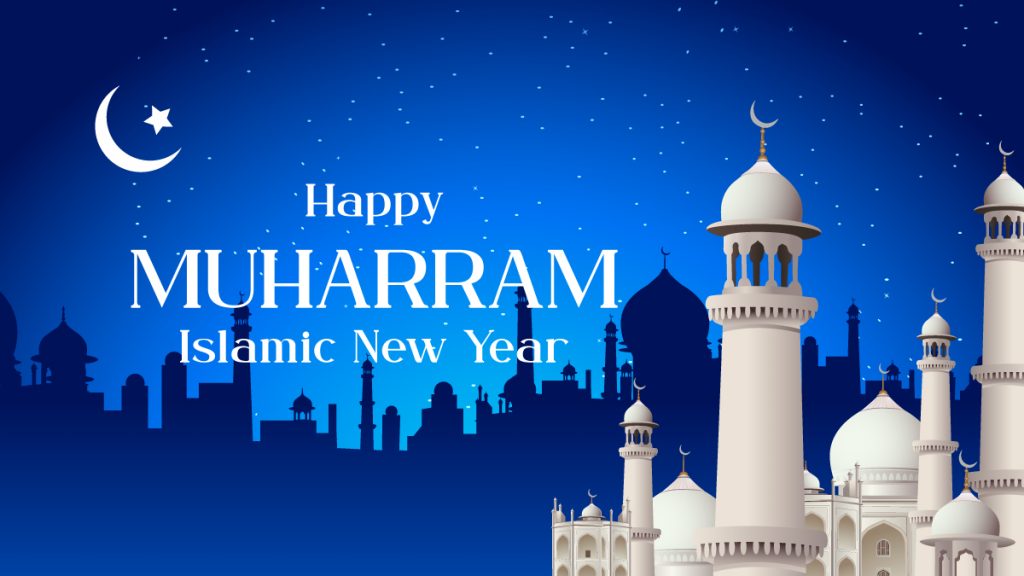Muharram is the first month of the Islamic calendar and holds deep religious significance for Muslims around the world. While it marks the Islamic New Year, Muharram is particularly remembered for the Day of Ashura, which falls on the 10th day of the month. This day commemorates the martyrdom of Imam Hussain, the grandson of Prophet Muhammad, who was killed in the Battle of Karbala in 680 AD. For Shia Muslims, Muharram is a month of mourning and reflection, observed with processions, prayers, and acts of devotion.
Muharram Dates for 2024, 2025, and 2026
To help you prepare for Muharram in the upcoming years, here are the dates:
| Year | Date (1st Muharram) | Date of Ashura | Day |
|---|---|---|---|
| 2024 | 08/07/2024 | 17/07/2024 | Wednesday |
| 2025 | 27/06/2025 | 06/07/2025 | Sunday |
| 2026 | 16/06/2026 | 25/06/2026 | Thursday |
The Significance of Muharram
Muharram is a sacred month in Islam, during which warfare and conflict are traditionally forbidden. For Muslims, Muharram is a time of spiritual reflection, prayer, and remembrance of the trials faced by early Muslims. The month is especially significant for Shia Muslims, who observe it as a period of mourning for the martyrdom of Imam Hussain at Karbala.
Imam Hussain, along with his family and companions, stood up against the tyrannical rule of Yazid I, the Umayyad caliph, and was killed in the battle. His sacrifice and steadfastness in the face of injustice serve as a powerful symbol of resistance and faith for Shia Muslims. The events of Karbala are recounted during Muharram, particularly on the Day of Ashura, when processions and mourning ceremonies take place.
How Muharram is Observed
The observance of Muharram varies between Sunni and Shia Muslims. While it is a time of fasting and prayer for both, Shia Muslims place a particular emphasis on mourning rituals in remembrance of Imam Hussain’s martyrdom.
- Fasting on Ashura: Many Sunni Muslims observe fasting on the 10th day of Muharram (Ashura) as a way of commemorating the day when Prophet Musa (Moses) and the Israelites were saved from Pharaoh. Fasting on this day is recommended but not obligatory.
- Mourning Processions: For Shia Muslims, the first ten days of Muharram are marked by mourning processions. These processions, known as Majlis, are held to retell the story of the Battle of Karbala and honour the martyrdom of Imam Hussain. Devotees often dress in black as a symbol of mourning, and some engage in acts of self-flagellation to express their grief.
- Recitation of Elegies (Marsiya and Noha): Elegies known as marsiya and noha are recited during Majlis to express sorrow for Imam Hussain’s suffering and to keep the memory of Karbala alive. These recitations are an important part of the mourning rituals.
- Charity and Acts of Kindness: In remembrance of the suffering of Imam Hussain and his companions, many Muslims engage in acts of charity during Muharram. Free food and water (Niyaz) are often distributed to the public, reflecting the hardships faced by Imam Hussain and his followers.
Muharram in Different Parts of India
Muharram is observed with solemnity across India, particularly in regions with significant Muslim populations. The way it is commemorated varies between Sunni and Shia communities.
- Kashmir: In the Kashmir Valley, Muharram is observed with large processions, particularly in the city of Srinagar. Shia Muslims gather in mosques and Imambargahs (Shia congregational halls) for prayers and sermons.
- Lucknow (Uttar Pradesh): Lucknow is known for its grand Muharram processions, particularly in the old city. The processions feature symbolic replicas of Imam Hussain’s tomb (Tazia), and thousands of Shia Muslims participate in these processions as a mark of respect and remembrance.
- Hyderabad (Telangana): In Hyderabad, Muharram is observed with processions, Majlis, and the distribution of food and water. The city’s large Shia community gathers in Imambargahs for prayers and mourning ceremonies.
- Mumbai (Maharashtra): Mumbai sees large Muharram processions, particularly in the areas of Dongri and Bhendi Bazaar, where Shia Muslims commemorate the martyrdom of Imam Hussain through Majlis and processions.
Muharram – A Time of Reflection, Remembrance, and Faith
Muharram, and particularly the Day of Ashura, serves as a time of deep reflection and mourning for the sacrifice of Imam Hussain. His steadfastness in the face of oppression is a powerful symbol of resistance against injustice, and his story resonates with Muslims worldwide. The rituals and ceremonies of Muharram allow Muslims to express their devotion and grief while reaffirming their commitment to the values of justice, truth, and faith.
For many, Muharram is a reminder of the importance of standing up for what is right, even in the face of great adversity. The lessons of Karbala continue to inspire Muslims to live lives guided by faith, compassion, and a commitment to justice.
Popular FAQs about Muharram
- Is Muharram a public holiday in India? Yes, Muharram is a gazetted public holiday in India. It is observed across the country, particularly in regions with significant Muslim populations.
- What is the significance of Ashura during Muharram? Ashura is the 10th day of Muharram and is significant for both Sunni and Shia Muslims. For Shia Muslims, it commemorates the martyrdom of Imam Hussain at Karbala, while Sunni Muslims observe it as a day of fasting and prayer.
- How do Shia Muslims observe Muharram? Shia Muslims observe Muharram with mourning processions, Majlis (religious gatherings), recitation of elegies, and acts of self-flagellation to express grief over the martyrdom of Imam Hussain.
- What is the importance of fasting during Muharram? Fasting during Muharram, particularly on the Day of Ashura, is observed by Sunni Muslims to commemorate the day when Prophet Musa (Moses) and the Israelites were saved from Pharaoh. It is a recommended but not obligatory practice.

